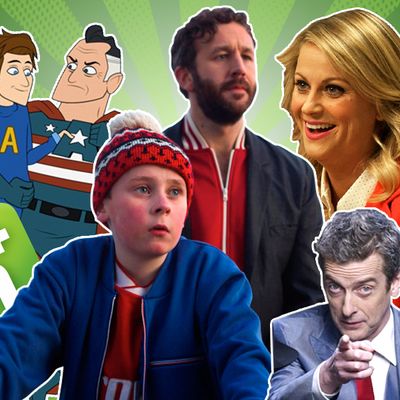
This morning, a few hundred entertainment journalists and bloggers began their initial descent into Beverly Hills for the semiannual Television Critics Association press tour, a two-week gathering where those of us in attendance will huddle in sunless hotel ballrooms and listen to dozens of pitches for the many new shows scheduled to roll out over the coming months. All six broadcast networks will hawk their wares, as will more than twenty cable outlets. But a medium-size shadow will also be cast at this year’s festivities by the comparatively new form of television known as subscription streaming video services, and in particular by the three major players in that upstart category: Hulu Plus, Amazon Prime, and Netflix.
In the past year, these SVOD outlets have emerged as legitimate competitors to the traditional television networks that have hogged the press tour spotlight since the inaugural TCA event back in 1978. Last week, Netflix broke through the linear ceiling, snagging fourteen Emmy nominations and becoming the first digital video service to land nominations in major categories. Earlier this year, as broadcasters blindly threw themselves into an ancient and secretive pilot process that typically results in more than half of all green-lit shows failing after just one season, Amazon was involving its customers in the process of deciding the fates of a handful of comedy and kiddie programs. And next week, Hulu will make its third appearance at the TCA press tour to tout a slate of original series headlined by an animated series from Saturday Night Live’s Seth Meyers. While none of these up and comers is yet anywhere near as big as a broadcast network or even most cable outlets, it’s clear that these digital networks are well out of their beta stage and have arrived as serious players in the TV marketplace. So just as we did with the broadcast networks during upfront week last May, Vulture will use the occasion of the TCA press tour to take a detailed look at the new Big Three of streaming: Netflix, Hulu Plus, and Amazon Prime. We’ve grilled the top executives who call the shots at each of the services about their programming plans and business strategies. We’ve dug into their content libraries to see where they’re strongest and weakest. And we’ve also quizzed a few Wall Street media analysts to get their take on the trio and how the services compare to each other.
First up: Hulu Plus, which launched in late 2010 as a subscription companion to the free online service. The company has already been put up for sale a couple of times, but earlier this month, its owners deemed the property more valuable than the offers it received and instead infused the venture with $750 million “to propel future growth.” Hulu Plus has found its niche as the go-to streaming service for anyone looking to catch up with recent episodes of broadcast and cable shows. But will that be enough going forward?
HULU PLUS
Subscribers: 4 million (as of April), up from 2 million a year ago
Library: 2,700 TV series, 4,400 movies (61,700 total hours of content)
Hit TV shows: 53 percent of Nielsen’s most-watched broadcast TV shows from the 2012–13 season are available to stream
Content pipeline: Originals currently airing or in production include The Awesomes and the half-hour Western comedy Quick Draw (from the team behind 10 Items or Less).
The big picture: Hulu began life back in 2007 as a way for its owners — the corporate giants behind ABC, NBC, and Fox — to better expose their TV programming on a single digital platform. And that’s still one of the service’s biggest selling points, even six years after launch. “If you want [current] seasons of TV shows still on the air, Hulu is the best place to find them,” says Rich Greenfield, a media analyst at BTIG. And often, it’s the only place to watch, at least on a subscription basis. If one of your summer goals, for example, is to catch up on ABC’s red-hot Scandal, you currently aren’t able to watch season two on Netflix, and ABC’s website will only let you watch the five most recent episodes. You could head over to Amazon or iTunes — but you’ll have to pay $2 an episode, or $25 for the full season, to view them (and that includes Amazon Prime members). At Hulu Plus (but not at regular Hulu), though, every single episode from the 2012–13 Scandal season is there for the streaming, each made available the day after it airs on ABC. The same is true of most NBC and Fox shows. While having access to so much programming from major cable and broadcast networks gives Hulu a big marketing hook, there’s a limitation: Its exclusive window for those shows is often pretty brief. Season two of Scandal, for example, will pop up on Netflix late next month, just three months after the show’s ABC season finale. And as DVR capacity gets bigger — you can now record hundreds of hours of programming on DirecTV’s Genie and DISH’s Hopper, for example — it’s becoming increasingly easy for viewers to record full seasons of shows themselves and stash them for offline binge-watching (although that isn’t a factor for the not-insignificant segment of the Hulu Plus subscriber base without cable or satellite service). Another issue for Hulu: While it has deep access to next-day network content, that access is not universal. Some shows that stream on the free Hulu can’t be watched on Hulu Plus; other shows can be seen on computers, but not iPads or an Internet-connected TV. It’s enough of an issue that Hulu has posted a full explainer in the support section of its website.

Acquired content: Realizing that network reruns wouldn’t be enough if it wanted to grow, Hulu began adding exclusive content a couple of years ago, starting with a heavy dose of imports. By the middle of 2011, the service was striking deals to become the only U.S. home for international shows such as the British sci-fi action comedy Misfits and the ominous Canadian drama The Booth at the End. It also helped fund production for the fourth season of Veep creator Armando Iannucci’s BBC comedy The Thick of It. Right now, it boasts 450 international titles, nearly half of which are Korean-language dramas and comedies, with more than 13,000 hours of content, quite a few of which aren’t available to stream on Netflix or Amazon Prime. A big reason why there are so many non-U.S. shows: Hulu often snags these series for a fraction of the usual license fees, instead offering international content creators a chance to share in the ad revenue the service brings in. Andy Forssell, acting CEO of Hulu, wouldn’t talk specifics, but did say that being able to offer producers a cut of ad revenue “gives us a lot of flexibility” when it comes to making deals for shows that otherwise might never get exposure in the U.S. “There’s also a lot of content on the service where we’ve said to content providers, ‘Let’s put it on and see how they do,’” Forssell explains. “We have some shows that are [straight] license fees, some that are revenue shares, and some that are something in the middle. We’re not religious about the model. Much of the licensing from the U.K. has been a hybrid model. There’s a fixed fee they lock in, but then there’s an upside” if the shows become hits. These shows just don’t get added to Hulu’s vast catalogue, either. Watch back-to-back episodes of Scandal, for instance, and you’ll soon be able to quote lines from imported British dramedy Pramface owing to Hulu’s nonstop promos for the show. Beyond the wide international selection, Hulu also has a deal with CBS for older programs (I Love Lucy, etc.); an agreement with WWE for next-day streaming of its content; and exclusive arrangements with the Criterion Collection, a few documentary production companies, and the makers of resurrected soaps All My Children and One Life to Live.
Original content: More recently, Hulu has followed Netflix by commissioning its own original series. In August 2011, six months after its rival announced plans for House of Cards, Hulu hired Morgan Spurlock to do the interview series A Day in the Life. And early last year, Hulu green-lit its first scripted show, Battleground, from producer Marc Webb (The Amazing Spider-Man). In 2013, Hulu has gotten even more aggressive: Before the year’s over, the service will have added the aforementioned The Awesomes and Quick Draw, as well as The Wrong Mans, a thriller from Doctor Who alum James Corden. Hulu has also bought in shows it didn’t develop internally, ensuring that they won’t air anywhere else in the U.S., such as East Los High and an upcoming Eva Longoria comedy dubbed Mother Up! Forssell says the combination of only-on-Hulu acquisitions, co-productions and original productions is an important part of the service’s strategy, but not the biggest element. “It’s good to have a chunk of programming where you’re the only place that has it,” he says, admitting that “about 5 to 6 percent” of the service’s content is exclusive. “I could see that doubling … [but] it’s not a quota we have to fill,” he says. As for how much Hulu spends on its originals, “We’re in the middle range of most cable budgets,” Forssell says. “We’re not chintzy by any means … [but] we don’t want to double down on the usual Hollywood model. Not because that’s wrong, but because it’s not in our DNA … We think constraints are good.”
Charlotte Koh, a former film exec whose résumé includes Fox Searchlight and Marvel, heads up Hulu’s original series development, working with a team of execs she calls “modest in size.” Hulu’s programming strategy, like its streaming rivals, is heavily influenced by the vast amount of data it gets from studying how and what viewers watch on the service. “We’re big believers in data-driven things,” Forssell concedes, but insists creative decisions aren’t a result of simply crunching numbers. “We’re also big believers in editorial voice,” he says. Koh says some projects have come from the usual Hollywood channels, “through reps and producers.” Others, such as the upcoming ‘toon The Awesomes, sprang from an evolution in a preexisting relationship Hulu had with a content provider, in this case, Lorne Michaels’s Broadway Video (whose entire SNL catalogue is streamable on Hulu Plus). Koh and Forssell refuse to attach any labels to the kinds of programming they’re looking to do. While strongly defined brands are common on linear TV — you don’t have to be a TV expert to spot a CBS drama or an FX comedy — Hulu right now isn’t looking to assemble a collection of shows with any common through line. “We don’t have to have a show conform to a network personality,” Koh explains.

What analysts say: Mike Olson, a media analyst at Piper Jaffray, echoes Greenfield’s assessment that Hulu excels when it comes to shows still airing. “If you’re looking for current shows, it’s Hulu,” he says. The biggest weakness of the service? “It’s just that: They mostly have TV content,” Olson says. “They don’t have any major blockbuster movies.” Also, as Greenfield notes, even though networks such as ABC have an ownership stake in Hulu (in ABC’s case, via common parent Disney), those same networks push viewers to watch their shows not on Hulu but on branded apps such as Watch ABC. At least in terms of buzz, Netflix is leaps and bounds ahead of Hulu Plus (and Amazon Prime) where its original content is concerned, as last week’s Emmy nominations underscored. There are some interesting acquired shows exclusive to Hulu Plus, like the all-Latino cast East Los High or the charming British teen drama Pramface. But as of yet, none of Hulu’s originals or true exclusives have become must-see. One reason Hulu might not have come on so strong and is playing a bit of catch-up is that, behind the scenes, there has been conflict between its main owners about the future of the service. (Longtime CEO Jason Kilar, perhaps sick of all the drama, left the service in January.) Indeed, until earlier this month, Hulu was up for sale. For now, its owners have retained the service and have funneled three quarters of a billion dollars into the business and take Netflix on in the original content department. And Hulu is already making a bigger push to promote its small slate of upcoming originals: The company is alone among the SVODs in showcasing its programming — including The Awesomes — at the TV Critics Association press tour.
Bottom line: Hulu rivals Netflix in terms of brand awareness, and its relationship with so many big TV companies gives it a ton of content with wide appeal. But it needs to dramatically bulk up its exclusives, while also hoping one of its upcoming originals generates the sort of buzz that now seems to come easily to Netflix.




